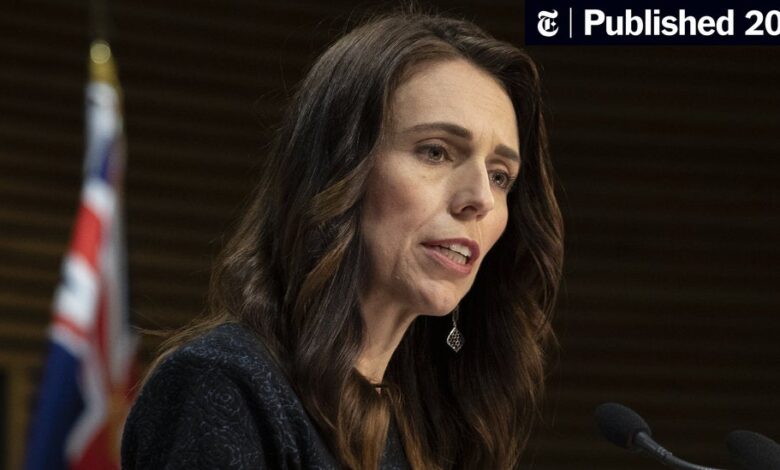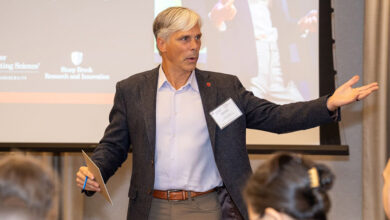What Makes a Great Leader?

What is your reaction to the video? Does it make a convincing case for Dr. Acton’s leadership? Do you agree that a good leader empowers listeners and makes them feel like “we’re in it together”? How important is it for leaders to be brutally honest? Should more leaders see “vulnerability as a strength,” as Dr. Acton does?
In “In a Crisis, True Leaders Stand Out,” the Times Editorial Board writes:
Leadership may be hard to define, but in times of crisis it is easy to identify. As the pandemic has spread fear, disease and death, national leaders across the globe have been severely tested. Some have fallen short, sometimes dismally, but there are also those leaders who have risen to the moment, demonstrating resolve, courage, empathy, respect for science and elemental decency, and thereby dulling the impact of the disease on their people.
The master class on how to respond belongs to Jacinda Ardern, the 39-year-old prime minister of New Zealand. On March 21, when New Zealand still had only 52 confirmed cases, she told her fellow citizens what guidelines the government would follow in ramping up its response. Her message was clear: “These decisions will place the most significant restrictions on New Zealanders’ movements in modern history. But it is our best chance to slow the virus and to save lives.” And it was compassionate: “Please be strong, be kind and united against Covid-19.”
Ms. Ardern, a liberal, then joined with the conservative prime minister of Australia, Scott Morrison, in shaping a joint effort that has all but eliminated the virus from their island nations.
Other examples of countries where swift and decisive action helped allay the impact of the disease and unite the nation range from South Korea and Taiwan in Asia to Germany, Greece and Iceland in Europe. Women, a minority among the national leaders of the world, emerged among the most effective and reassuring of them.
Like Ms. Ardern, Chancellor Angela Merkel of Germany acted early and calmly, warning Germans that many of them would fall prey to the novel coronavirus, and quickly getting testing underway. President Tsai Ing-wen of Taiwan likewise responded at the first sign of the new danger, keeping the virus under control and enabling her to send millions of face masks to the United States and Europe. In Iceland, Prime Minister Katrin Jakobsdottir led the government in offering free coronavirus testing for all and organizing a thorough tracking system.
Prime Minister Mette Frederiksen of Denmark, Finland’s prime minister, Sanna Marin — at 34 among the youngest of the world’s leaders — and Norway’s prime minister, Erna Solberg, are other women who have earned plaudits at home and abroad for their handling of the crisis.
The editorial continues:
That said, the leaders who have gained the respect and attention of their people, and who have succeeded in dulling the impact of the disease, share certain traits and approaches to leadership worth noting as this pandemic roars on — and for future crises as well.
A willingness to take quick and bold action, even when it carries political risk, is surely among the most important hallmarks of leadership in a crisis. It is now obvious that China’s efforts to conceal the outbreak, or President Trump’s to downplay it for far too long, proved disastrous. Ms. Ardern, by contrast, chose, as she put it, to “go hard and go early.”
Other elements of effective leadership include a respect for science, transparent messaging, constant updating of the evidence and prompt assurance of financial support. And also experience: Ms. Merkel’s background as a scientist is by all accounts a major factor in her credibility; in Ireland, Prime Minister Leo Varadkar’s background as a doctor prompted him to start giving phone consultations half a day each week and helped boost his previously flagging standing.
Beyond politics, economics and science lie qualities of character that can’t be faked, chiefly compassion, which may be the most important in reassuring a frightened, insecure and stricken population. Ms. Merkel is arguably among the least flashy, charismatic or eloquent of Europe’s leaders, but nobody would ever question her decency. When she addressed her nation on television, something she does rarely and with evident reluctance, there was nothing pompous or bombastic in her parting words: “Take good care of yourselves and your loved ones.”
Students, read the entire editorial, then tell us:
-
In your opinion, what makes a person a great leader? Which qualities of leadership described in the video and the editorial do you most value?
-
What role should leaders, in government and elsewhere, play during a crisis like this one? Which leaders — local or global, famous or not — do you think have most effectively risen to challenges of the pandemic?
-
What qualities of good leaders do you possess? Tell us about an experience you’ve had as a leader. What did you learn? What mistakes did you make? What life lessons might you be able to give to others as a result? Are there ways that you can use or develop your leadership skills now?
-
The Times editorial notes that many of the most effective national leaders during this crisis are women. What is your reaction? Are you surprised?
Students 13 and older are invited to comment. All comments are moderated by the Learning Network staff, but please keep in mind that once your comment is accepted, it will be made public.
Source link




